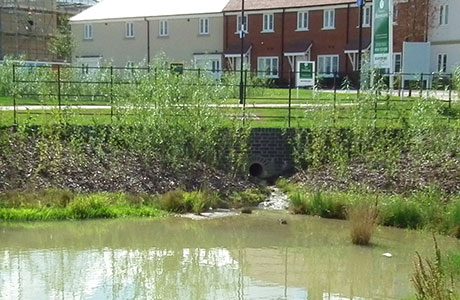A RADICALLY-revised system for regulating SuDS implementation on new developments is in danger of becoming a ‘fudge’ and a ‘free-for-all’ that could jeopardise effective flood control and environmental water quality, drainage experts warn.
Alex Stephenson, chair of the British Water Surface Water Management Focus Group and Group Market Development Director of Hydro International said: “The speed and scale of changes have come as a surprise to many, caused confusion and raised many unanswered questions. The result could be a free-for-all for SuDS. Despite the Government’s intentions, the outcome could well be a fudge and a ‘post code’ lottery that sees fewer schemes built to SuDS principles with no robust way of ensuring they will be maintained or work as designed.
“To mitigate this, a strong lead will be essential to ensure sensible and practical national guidance that lays out a full toolbox of both natural and manufactured SuDS components, with clear, repeatable maintenance schedules. The revised CIRIA SuDS manual will be a critical part of this and must reflect a pragmatic approach to a national framework for best practice.

“The new system addresses developer concerns that compulsory SuDS might hamper the building recovery by increasing development time, construction and land-opportunity costs, and that all Local Authorities were not fully ready to take up the SAB mantle and more importantly, maintain and adopt the SuDS.
“Instead the existing planning system will be strengthened to incorporate an ‘expectation’ for SuDS on new developments of 10 properties or more, according to National Standards. The consultation also sets out a requirement for developers (rather than the Local Authority as previously proposed) to demonstrate how SuDS components will be effectively maintained.
“However, in practice, it’s hard to be confident that the proposals will truly encourage a greater uptake of SuDS on the scale originally intended and will deal sufficiently with environmental water quality.
“In particular, the proposals may give too much leeway for planners to exempt the use of SuDS if the developer argues successfully that they are too costly to build or maintain. They may also be subject to widely-differing local policies.
“I am also extremely concerned that there is no clear indication of how SuDS components will be monitored to check they are built properly and perform as designed throughout their life. There’s no suggestion so far that they will be inspected by Building Control or another body to check they are built and continue to be effective.
“Manufactured products come with a predictable and repeatable maintenance schedule, but it’s much harder to predict how natural features will continue to perform and all components need to be maintained properly. We have already seen examples of SuDS being left ‘orphaned’ or neglected both in both Scotland and England and a so-called ‘flexible and permissive’ approach to maintenance in practice could end up seeing SuDS that simply do not provide the flood control and treatment required.
“To be effective, these proposals must reflect a truly pragmatic and sensible approach to meeting source control and water quality objectives using the entire SuDS toolbox and both natural and manufactured components.
A Government consultation on the proposals closed on 24 October.







